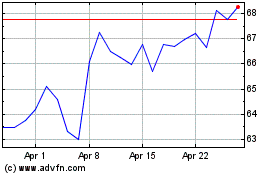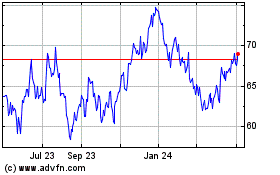Rio Tinto Cautions on Oyu Tolgoi Project, Alumina Contracts -- Commodity Comment
October 15 2018 - 8:56PM
Dow Jones News
By Rhiannon Hoyle
Rio Tinto PLC (RIO.LN), the world's second biggest mining
company by market value, on Tuesday released its third-quarter
operational report. The miner said quarterly Australian iron-ore
exports were lower, as was production of most other commodities
including bauxite and titanium dioxide. Here are some remarks from
the report.
On Australian iron-ore production:
"Pilbara iron ore shipments of 81.9 million [metric] tons (100%
basis) in the third quarter were 5% lower than the third quarter of
2017, due to planned maintenance cycles and safety pauses across
all operations following [a] fatality. Pilbara operations produced
251.2 million tons (Rio Tinto share 209.7 million tons) in the
first nine months of 2018, 4% higher than the same period of 2017
due to favorable weather conditions in the first half, a continued
improvement in mine and rail capacity as Silvergrass ramps up and
ongoing productivity improvements across the integrated
system."
On driverless trains:
"The automation of the Pilbara train system (AutoHaul) is in
ramp-up, with a steady increase in the number of trains in
autonomous mode over the third quarter. Autonomous mode operations
have increased to an average of 34 trains per day, equating to
290,000 kilometres (or 45% of daily kilometres) completed in this
mode. Full implementation of AutoHaul is expected by the end of
2018."
On its Oyu Tolgoi project:
"Following an annual re-forecast of the Oyu Tolgoi underground
development schedule and costs, capital costs remain in line with
the overall US$5.3 billion budget and construction of the first
draw bell is still expected in mid-2020. The preliminary
re-forecast assessment indicates ground conditions and shaft
sinking challenges that are ultimately expected to result in a
revised ramp-up schedule to sustainable first production."
On bauxite production:
"Bauxite production of 12.7 million tons was 1% lower than the
corresponding quarter of 2017, with strong production at Weipa
offset by lower production at the non-managed Sangaredi and Porto
Trombetas mines. Third-party shipments increased by 2% to 8.4
million tons, reflecting firm demand."
On aluminum production:
"Aluminum production of 0.9 million tons was 1% lower than the
third quarter of 2017 due primarily to ongoing labor disruptions at
the non-managed Becancour smelter in Canada. Full-year guidance has
been revised to between 3.4 and 3.5 million tons (previously 3.5 to
3.7 million tons).
On alumina-price impact:
"Although Rio Tinto is broadly balanced in alumina, it is
exposed to long-term legacy alumina sales contracts, which are LME
[London Metal Exchange] linked. The negative impact on Ebitda of
these legacy contracts, due to the significant escalation in the
alumina index price as a result of industry supply disruptions, was
US$178 million in the first half of 2018 and a further US$130
million in the third quarter."
On Cadadian iron-ore operations:
"Production at Iron Ore Company of Canada was 9% lower than the
third quarter of 2017, however significantly higher than the
previous quarter as operations ramped up to normal production rates
following a labour dispute in the previous quarter."
Write to Rhiannon Hoyle at rhiannon.hoyle@wsj.com
(END) Dow Jones Newswires
October 15, 2018 20:41 ET (00:41 GMT)
Copyright (c) 2018 Dow Jones & Company, Inc.
Rio Tinto (NYSE:RIO)
Historical Stock Chart
From Jun 2024 to Jul 2024

Rio Tinto (NYSE:RIO)
Historical Stock Chart
From Jul 2023 to Jul 2024
